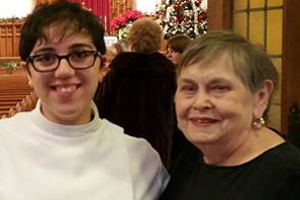by Elyssa Salinas
What is in a name? Why does it matter so much? I have lived most of my life with a nickname. My nickname, “E” began in 5th grade because my teacher could not pronounce my first name. The nickname stuck through high school. No one but my parents referred to me by my given name. As an adult, my name has become more important to me because of the women I was named after.
I was named after both of my grandmothers, Elisa and Joanne. My parents thought the name honored both of these amazing women.
On my mom’s side Joanne is the grandmother that I spent the most time with growing up. She was in business before it was common for women. And she never took no for an answer. She was a powerful woman who taught me to honor my vocation and passion with hard work.
My paternal abuela (grandmother) was named Elisa. She was born and lived in a little village in Mexico until her death. She married young and spent two decades being pregnant. She gave birth to 16 children. When I visited her as a child I was not able to speak with her because I did not know Spanish. Even though we could not communicate with words, she showed me the importance of caring for a family through the language of cooking.
My grandmother Joanne
 I remember going to church every Sunday with my family, but especially with my grandmother. I would sit in the third pew from the front on the left side, letting my grandmother take the edge as it is the best view of the pulpit and the liturgical action. We still go to church together.
I remember going to church every Sunday with my family, but especially with my grandmother. I would sit in the third pew from the front on the left side, letting my grandmother take the edge as it is the best view of the pulpit and the liturgical action. We still go to church together.
After church, we always talk about the service and leave no stone unturned. We talk about the movement of the music. We talk about whether one of the hymns ignites a memory for her. On our drive home she never fails to tell me a story about her childhood. We discuss the sermon and if the pastor took into account all of the texts for the day. Since we both have a background in public speaking, the preaching style is never ignored. Later, we might look back at the bulletin, discuss prayers or the choir and anything we forgot to talk about earlier.
This conversation is never short because with every detail of the service, I get to hear her stories about faith and religion, of what it means to be in church and what it means to share her faith with me. Yet these stories are not only about church services. Late at night over too many cups of coffee, my grandmother also shares with me what it means to be a woman through her own life’s experiences.
At each step of my journey she has been there with a kind word, a story, lots of cheese and a book to give me guidance. Often, this book has been the Bible. I love opening up the pages and finding stories outside of the ones learned in Sunday school. My fondest memory of my grandmother giving me a book is when I broke up with my college sweetheart. The next morning, she pulled down from her bookshelf Women Who Run with the Wolves and told me it was time for me to read it. Storytelling is a key aspect to my spirituality now because of the stories she has told me over and over.
My abuela Elisa
I knew that my abuela was a very religious woman because there were statues of the Virgin Mary and Santa Niño (baby Jesus) all over the house. As she got older she was no longer able to attend church. Although, my abuela and I were never able to talk with one another about faith, she found a different way to communicate with me.
I would watch her in the kitchen as she moved around a little stove and tiny table. I would wonder what breakfast must have been like when my father was a kid. I would watch her go from dish to dish, cooking and tasting even as her sight was failing. She would pull out her tortilla press and began rolling dough for the tortillas we would have with lunch. She showed me how to roll the dough with a tiny press, one small enough for my 7-year-old hands, and we pressed tortillas together. She placed my little discs beside hers on the plate, showing me that mine were just as important as hers. This showed me how a connection can happen without words. With my abuela, I learned that making tortillas can feel like praying, and that everyday tasks are spiritual. God can be unspoken words with love that comes through loud and clear.
Both of these women provided me with a sense of what it means to be spiritual and gave me an understanding of who God was to them. What I find incredible is that these women never met, yet through me they became intimately connected. A born and bred Lutheran from Wisconsin and a staunch Roman Catholic from Mexico, these women were from opposite sides of every spectrum, and yet they are both within me. When I reflect on my name, I remember these two incredible women who shared God with me and enabled their granddaughter to find God for herself. Whether I sit in a pew or make tortillas, I am reminded that God resides in relationships. God is present when I pray in church and God is present when I cook. God is present. Always.
Discussion questions:
1. What is your earliest memory of time with a grandmother or matriarchal figure?
2. How is God present in your life?
3. How do you pass on your view of God to those around you?
Closing prayer:
Loving God, bless those who have showed us who you are through words and actions. Embrace us in your bosom and let us feel your love this day and each day to come. Guide us as we journey through and let us remember those who came before us. Bless great women who have become matriarchs in our lives. In your loving name, Amen.
Elyssa Salinas is a student at the Lutheran School of Theology at Chicago and is graduating from the master of divinity program this May. In the fall she will continue at LSTC, pursuing a doctorate in theology with a focus in sexual ethics. She recently became the program assistant in Hunger Education at the Evangelical Lutheran Church in America and loves to write and perform poetry in the Chicago area.
Photo by Morguefile. Used with permission.
Photo of Elyssa (left) and her grandmother, Joanne. Photo courtesy of Elyssa.


My dear, Elyssa,
I feel as though I know your grandmothers and you! I cannot wait to engage in this discussion/conversation with other women. I, too, was very close to my Grams, and they taught me a great deal about faith and my relationship with God. Unfortunately my Grams and my Mom are no longer with me on earth but I remember them with love and appreciation for all they did for me and my faith journey. So many of us have been blessed by our foremothers and what better time to reflect on this than as Mother’s Day approaches. God bless you.